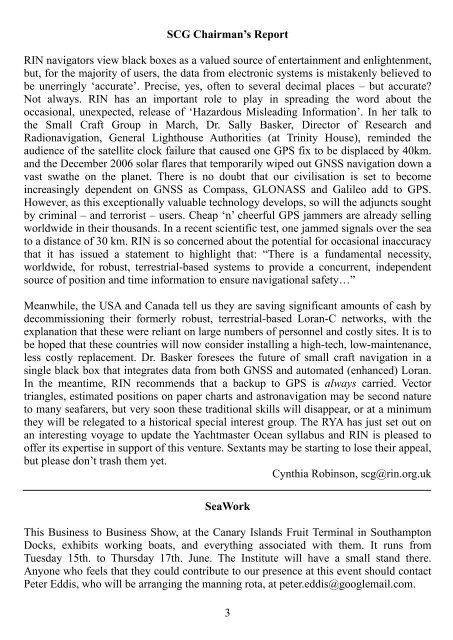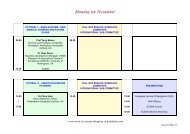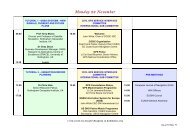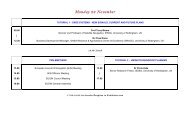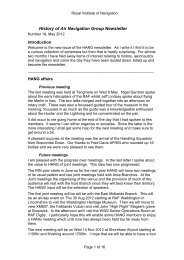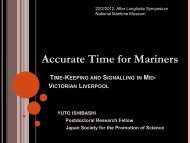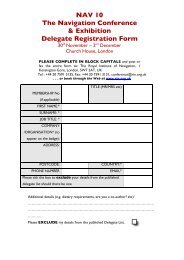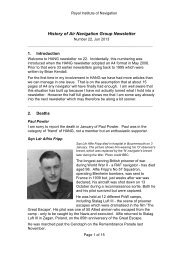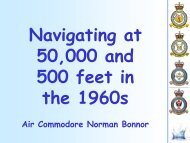Fairway 30 - Royal Institute of Navigation
Fairway 30 - Royal Institute of Navigation
Fairway 30 - Royal Institute of Navigation
Create successful ePaper yourself
Turn your PDF publications into a flip-book with our unique Google optimized e-Paper software.
SCG Chairman’s Report<br />
RIN navigators view black boxes as a valued source <strong>of</strong> entertainment and enlightenment,<br />
but, for the majority <strong>of</strong> users, the data from electronic systems is mistakenly believed to<br />
be unerringly ‘accurate’. Precise, yes, <strong>of</strong>ten to several decimal places – but accurate?<br />
Not always. RIN has an important role to play in spreading the word about the<br />
occasional, unexpected, release <strong>of</strong> ‘Hazardous Misleading Information’. In her talk to<br />
the Small Craft Group in March, Dr. Sally Basker, Director <strong>of</strong> Research and<br />
Radionavigation, General Lighthouse Authorities (at Trinity House), reminded the<br />
audience <strong>of</strong> the satellite clock failure that caused one GPS fix to be displaced by 40km.<br />
and the December 2006 solar flares that temporarily wiped out GNSS navigation down a<br />
vast swathe on the planet. There is no doubt that our civilisation is set to become<br />
increasingly dependent on GNSS as Compass, GLONASS and Galileo add to GPS.<br />
However, as this exceptionally valuable technology develops, so will the adjuncts sought<br />
by criminal – and terrorist – users. Cheap ‘n’ cheerful GPS jammers are already selling<br />
worldwide in their thousands. In a recent scientific test, one jammed signals over the sea<br />
to a distance <strong>of</strong> <strong>30</strong> km. RIN is so concerned about the potential for occasional inaccuracy<br />
that it has issued a statement to highlight that: “There is a fundamental necessity,<br />
worldwide, for robust, terrestrial-based systems to provide a concurrent, independent<br />
source <strong>of</strong> position and time information to ensure navigational safety…”<br />
Meanwhile, the USA and Canada tell us they are saving significant amounts <strong>of</strong> cash by<br />
decommissioning their formerly robust, terrestrial-based Loran-C networks, with the<br />
explanation that these were reliant on large numbers <strong>of</strong> personnel and costly sites. It is to<br />
be hoped that these countries will now consider installing a high-tech, low-maintenance,<br />
less costly replacement. Dr. Basker foresees the future <strong>of</strong> small craft navigation in a<br />
single black box that integrates data from both GNSS and automated (enhanced) Loran.<br />
In the meantime, RIN recommends that a backup to GPS is always carried. Vector<br />
triangles, estimated positions on paper charts and astronavigation may be second nature<br />
to many seafarers, but very soon these traditional skills will disappear, or at a minimum<br />
they will be relegated to a historical special interest group. The RYA has just set out on<br />
an interesting voyage to update the Yachtmaster Ocean syllabus and RIN is pleased to<br />
<strong>of</strong>fer its expertise in support <strong>of</strong> this venture. Sextants may be starting to lose their appeal,<br />
but please don’t trash them yet.<br />
Cynthia Robinson, scg@rin.org.uk<br />
SeaWork<br />
This Business to Business Show, at the Canary Islands Fruit Terminal in Southampton<br />
Docks, exhibits working boats, and everything associated with them. It runs from<br />
Tuesday 15th. to Thursday 17th. June. The <strong>Institute</strong> will have a small stand there.<br />
Anyone who feels that they could contribute to our presence at this event should contact<br />
Peter Eddis, who will be arranging the manning rota, at peter.eddis@googlemail.com.<br />
3


